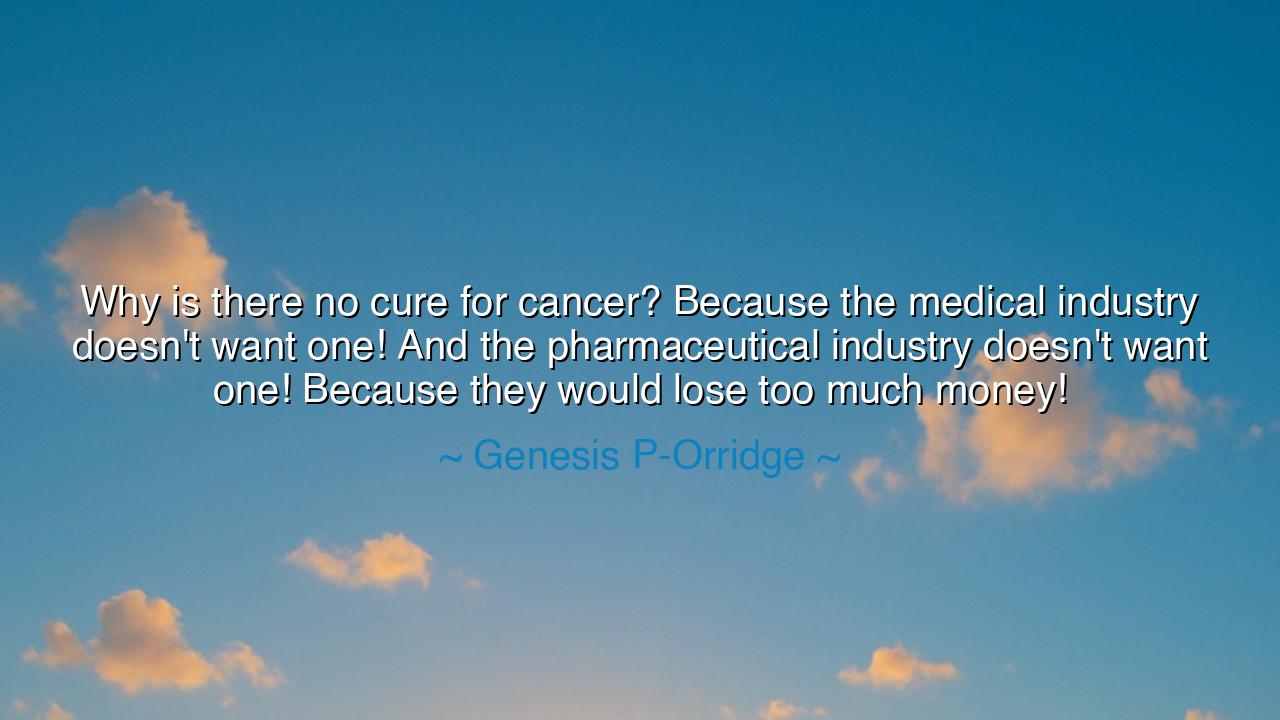
Why is there no cure for cancer? Because the medical industry
Why is there no cure for cancer? Because the medical industry doesn't want one! And the pharmaceutical industry doesn't want one! Because they would lose too much money!






Hear the thunderous cry of Genesis P-Orridge, artist and provocateur, who declared with fiery suspicion: “Why is there no cure for cancer? Because the medical industry doesn't want one! And the pharmaceutical industry doesn't want one! Because they would lose too much money!” These words are not the measured notes of a scientist, but the anguished shout of one who sees corruption in the very institutions meant to heal. It is a cry of distrust, a challenge to power, and a reminder that whenever money and life are entwined, vigilance is demanded of the people.
The meaning is layered. On its surface, the statement accuses the medical and pharmaceutical industries of preferring profit to healing, of perpetuating treatments rather than pursuing cures, for in treatment lies steady income, while in a cure lies the end of profit. Beneath this, however, lies a deeper truth: that the people’s faith in their institutions withers when they see greed at work. Whether or not the accusation is wholly just, the power of the quote arises from the fear that profit has overtaken compassion, and that humanity’s suffering has become a marketplace.
History offers grim reminders of when such fears were justified. Recall the tobacco companies of the 20th century, who for decades denied the deadly truth of smoking, burying research and deceiving the public, all to protect their rivers of gold. Millions perished while profits swelled. Or think of Big Oil, suppressing evidence of climate change even as the world burned. These examples give weight to P-Orridge’s words: if industries once betrayed the people for wealth, can it not happen again in matters of health?
Yet there is also another side. The story of Jonas Salk, who gave the world the polio vaccine without seeking profit, shines as a counterexample. Asked who owned the patent, he said, “The people, I would say. Could you patent the sun?” Here was a man who placed humanity above wealth, proving that goodness can dwell within science and medicine. His life rebukes the despair in P-Orridge’s words, reminding us that not all healers are corrupted, and that the true spirit of medicine is to serve.
The origin of this fiery declaration lies not in laboratories, but in the world of art and counterculture. Genesis P-Orridge, ever the challenger of norms, voiced suspicion toward systems of power, pointing to the possibility that suffering may be prolonged when profit is greater than cure. Whether or not the claim holds literal truth, its symbolic truth remains: that when institutions grow vast and wealthy, the people must guard against their corruption. For unchecked power, whether in temples, empires, or industries, too often bends toward self-preservation rather than service.
The lesson, child of tomorrow, is this: do not surrender blind trust to institutions. Respect science, honor medicine, but also question, watch, and demand transparency. Insist that healing remain the first goal, not wealth. Support those researchers who labor not for riches, but for life. And cultivate in yourself the courage to challenge systems that place gold above human dignity. For respect without accountability breeds tyranny, and trust without vigilance invites betrayal.
To live by this teaching, be both supporter and guardian. Support advances in medicine, donate, participate in advocacy, lift up those who strive for cures. But also be a guardian: demand openness from industries, question motives when profit grows alongside suffering, and refuse to be lulled by polished words. Let your voice, joined with others, remind the mighty that their wealth comes from the pain of the people, and their duty is not to profit but to heal.
Thus the words of Genesis P-Orridge endure: “Why is there no cure for cancer? Because they would lose too much money!” Whether taken as accusation or parable, they burn with the eternal warning that greed is the enemy of compassion. May they stir in you both vigilance and hope, so that the healing arts of the future are guided not by profit, but by the sacred duty to preserve life.






AAdministratorAdministrator
Welcome, honored guests. Please leave a comment, we will respond soon